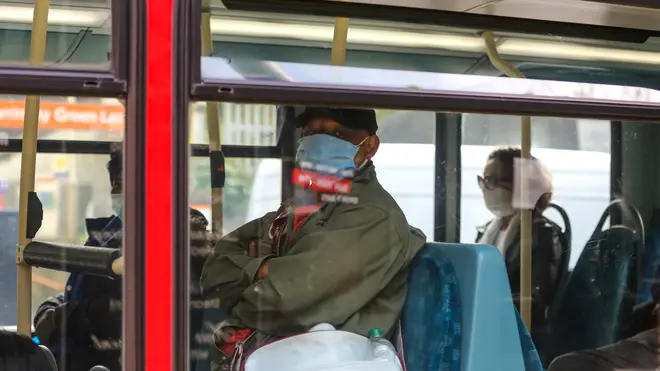
Shelagh Fogarty 1pm - 4pm
4 June 2020, 17:10

Face masks will be mandatory on public transport in England from June 15, Transport Secretary Grant Shapps has announced.
Speaking at the daily Government coronavirus press briefing, Mr Shapps said the rule will come into force on the same day non-essential shops re-open.
The public will have to provide their own face coverings and operators will have the powers to enforce the new rule.
Those who do not comply could be refused travel and may be fined.

Nick Ferrari asks Transport Secretary why facemasks are introduced now
Mr Shapps emphasised that this meant "the kind of face covering you can easily make at home" and not surgical masks.
At the Downing Street press conference Mr Shapps said: "I can announce that as of Monday June 15 face coverings will become mandatory on public transport.

Face coverings to be made mandatory on public transport in England
"That doesn't mean surgical masks, which we must keep for clinical settings. It means the kind of face covering, you can easily make at home. There will be exemptions to these rules for very young children, for disabled people and those with breathing difficulties."
He said "we need to ensure every precaution is taken on buses, trains, aircraft, and on ferries".
"With more people using transport the evidence suggests wearing face coverings offers some - albeit limited - protection against the spread for the virus."
Mr Shapps told the press conference the changes would be made under the National Rail conditions of travel and public service vehicle regulations for buses.
"This will mean that you can be refused travel if you don't comply and you could be fined.
"Alongside transport operators, this will be enforced by the British Transport Police if necessary, but I expect the vast majority of people won't need to be forced into this, because wearing a face covering helps protect others."
Listen & subscribe: Global Player | Apple Podcasts | Google Podcasts | Spotify
Network Rail chairman Sir Peter Hendy has said he expects most passengers to comply with the requirement to wear face coverings.
"I am not expecting a huge upsurge in railway staff having to police this," he told the No 10 daily briefing.
"I am expecting sensible passengers to do their duty and look after themselves and others."
Mr Shapps said that if people refused to comply they could be fined.
"It is condition of travel. You cannot travel unless you are wearing a face covering," he said.
"There will also be other powers so it could ultimately lead to fines. I very much hope we won't be in that situation."
The Government had already advised the public to wear a face covering in places where social distancing was not always possible, such as in shops and on buses or trains.
The World Health Organisation says “wearing a medical mask can limit the spread of certain respiratory viral diseases, including COVID-19” but that “the use of a mask alone is not sufficient to provide an adequate level of protection.
“Other measures such as physical distancing and hand hygiene should be adopted.”
The announcement came hours after Scottish First Minister Nicola Sturgeon said she will "strongly encourage people" to wear face coverings in shops but is still considering whether to make it mandatory.
In response to the announcement, Mayor of London Sadiq Khan said: “I’m pleased that our lobbying has paid off and the Government has finally seen sense and made it mandatory for people to wear face coverings on public transport.
"This is something I and others have been calling on ministers to do for some time, and is in line with a large body of evidence that they can help stop the spread of coronavirus.
“I encourage anyone travelling on public transport, or anywhere you can’t keep a safe 2 metre distance, to wear a face covering, but from Monday 15 June, everyone must wear a covering over their nose and mouth for the entirety of any journeys made using the public transport network.
"This will be mandatory and will help everyone be safer.
“TfL continues to work hard to maximise services despite staff being ill, shielding or self-isolating.
"The reality is that due to social distancing the effective capacity of public transport services has been dramatically reduced. We can only carry between 13% - 15% of passengers.
"We all must play our part by working from home if we can and making journeys on foot or by bike if at all possible in order to keep the service safe for those who really need it.
"I want to thank Londoners who have made monumental sacrifices over the last ten weeks and stuck to the rules. I urge them to continue to do so to help save lives.”
Mick Cash, general secretary of the Rail, Maritime and Transport union (RMT), said: "The RMT has been campaigning for compulsory wearing of masks on public transport and this is long overdue, but we fear this announcement is being driven not by safety concerns but by the premature easing of the lockdown which is swelling passenger numbers and making social distancing on transport increasingly impossible.
"By themselves, face masks are nowhere near enough to protect passengers and worker safety on public transport.
"They need to be combined with preventing non-essential travel and compulsory enforcement of two-metre social distancing."
Mick Whelan, general secretary of the train drivers' union Aslef, said: "This is a sensible step. We have been working closely with the Government to ensure that agreed increases in services on Britain's train and Tube network is done in a safe and controlled manner, to help spread the loading, and maintain social distancing for the safety of passengers and staff.
"The instruction to wear face coverings to help prevent the spread of the coronavirus will ease the concerns of people travelling, and working, on the transport network."